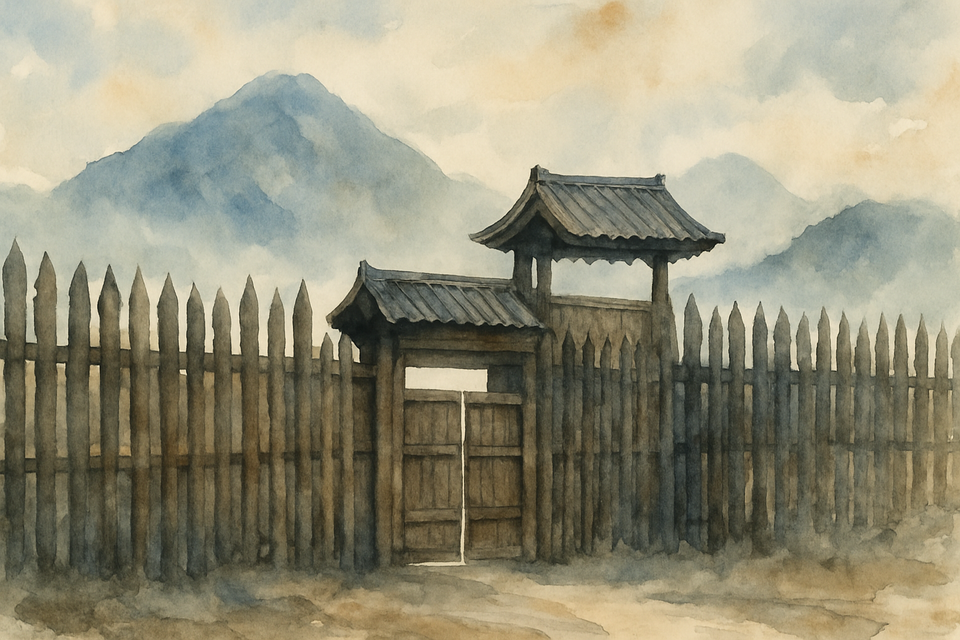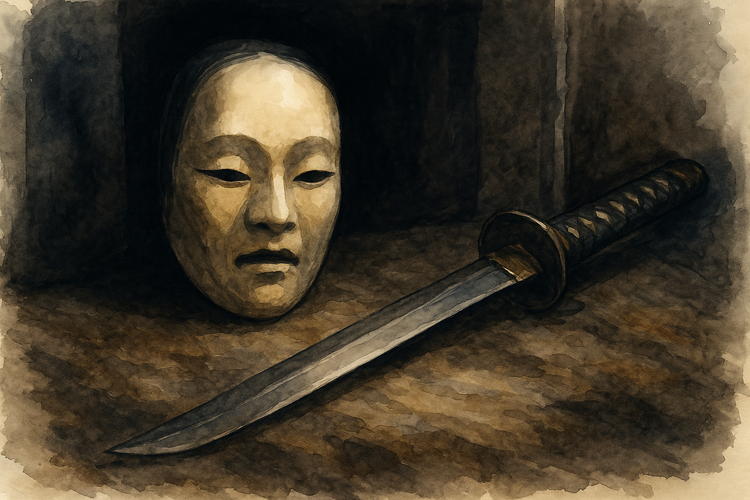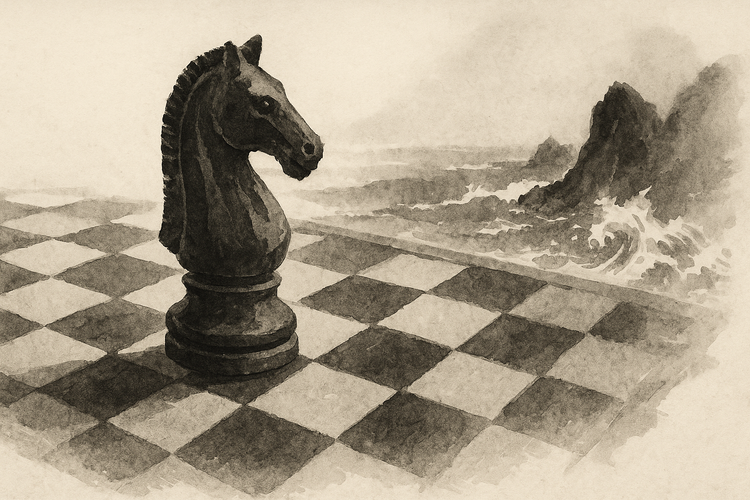Shōgun S1E4 "The Eightfold Fence"

Extensive spoilers for Episode 4 follow.
The title of this episode, “The Eightfold Fence,” gestures toward more than a military strategy or a wall of defense; it evokes the inner stronghold each character must construct in order to endure. As Mariko explains, the eightfold fence is not meant to be breached from without, but to serve as a sanctuary within — a place where grief, desire, or fear can be hidden behind layers of restraint and custom. The phrase carries echoes of Japanese poetics: the fence as both enclosure and refuge, protection and isolation. It is a metaphor of survival, but also of loneliness, suggesting that the more carefully we guard ourselves, the further we drift from true freedom.
Throughout the episode, we watch characters erect these unseen barriers: shields of loyalty, masks of duty, or sudden silences that conceal what cannot be spoken aloud. The battlefield preparations that churn in the open are matched, and perhaps even overshadowed, by the hidden battles within. Armies are raised, regiments trained, and alliances tested, yet the deeper drama plays out in the invisible fortifications of the self.
Schemes in the Wake of Resignation
Word of Toranaga’s resignation spreads like fire in dry grass, and Yabushige reels at the news, recognizing that the fragile balance of power has shifted against them. His panic drives him into hurried scheming with Omi, the two imagining how they might preserve themselves if the Council finds a replacement and demands Toranaga’s head. Their talk of offering their regiment to Ishido reveals how quickly loyalty can erode when survival is at stake.
This is Yabushige at his most revealing — equal parts cunning and cowardly. He can posture as a samurai, but at the first hint of danger he scrambles for an escape route, always willing to sell one loyalty to purchase another. Omi, caught between admiration and suspicion, contributes as both subordinate and uneasy partner, aware that their calculations might doom them as easily as save them.
Around them, Kiku drifts like a spark near dry tinder — not merely ornamental but unsettling, her presence feeding Omi’s suspicions and reminding us how desire can loosen the seams of order. She embodies the way intimacy, even in glances and whispers, destabilizes political structures. Authority technically remains intact with Omi as village lord and Yabushige as his superior, but Toranaga’s absence sharpens the sense of peril, as though the outer fence has been left vulnerable while enemies gather. The fortress still stands, yet already its walls creak.
Blackthorne Outside the Walls
When Blackthorne arrives in Ajiro, his disorientation is immediate. The village readies itself to receive him with honor, yet every gesture of hospitality underscores how little control he holds. Searching for his men, he learns from Mariko that both they and his ship now belong to Toranaga — stripping him of the last illusions of command. He is given a house and assigned Fuji as consort, a role he tries to refuse but cannot escape, for custom now binds him as Hatamoto.
For a man trained in naval order, whose authority was once unquestioned on deck, the loss is almost unbearable. Discipline and command had been his walls, the fences that structured his life at sea. Now, in this land of unseen boundaries, he finds himself walled in by customs he barely grasps and walled out from the autonomy he once enjoyed. His protests only highlight his vulnerability: a man with no defenses of his own, exposed outside the walls that shelter everyone else. He is not only unfortified but actively stripped, standing before a fortress whose gates will not admit him.
Fuji’s Fortress of Survival
Fuji stands at the heart of this theme, a woman whose life has already been shattered yet who carries herself as if within her own hidden fortress. She enters Anjin’s world not by choice but by duty, assigned as his consort in the aftermath of her husband’s seppuku and the death of her child. Her calmness suggests impassivity, as though her grief has been folded behind invisible gates.
And yet, in quiet moments, her strength reveals itself. When she vows to guard Blackthorne’s guns with her life, she speaks not only of loyalty but of selfhood — finding agency within the narrow walls left to her. The symbolic exchange of weapons between them, his pistol for her father’s swords, becomes more than courtesy; it is a recognition that behind her fortress lies dignity, and behind her silence, authority. Fuji embodies the eightfold fence not as retreat but as paradox: her grief has hollowed her life, yet within that hollow she builds a citadel. Survival, for her, is both fragile and indestructible.
Mariko’s Prison of Silence
If Fuji embodies the eightfold fence through quiet resilience, Mariko gives it voice. It is she who explains the concept to Anjin, translating not only words but an entire way of surviving in a world of duty and silence. Her own life is a study in concealed layers: a noblewoman bound by faith and loyalty to Toranaga, yet inwardly drawn to the foreigner she is tasked to guide.
Her Christian faith becomes another kind of wall. It separates her from those around her, a source of strength but also of isolation. Within its enclosure she finds meaning, but also the impossibility of escape. When she shares fragments of her past with Anjin, or indulges in the fantasy of what they might do together in London, we glimpse how tightly her inner fortress must be sealed. Even her nighttime visit — suggested but never named aloud — feels less like surrender than another carefully walled chamber of the self. With Mariko, the eightfold fence becomes not only protection but also prison, a structure that allows her to endure yet keeps her desires forever contained.
The Fences Splinter
The episode closes by widening back to the political front. Yabushige and Omi continue their desperate calculations, measuring survival against loyalty, while Kiku lingers nearby, her presence an unspoken provocation. The tenuous balance collapses when Toranaga’s son turns Blackthorne’s cannon on Ishido’s men, firing the first shots of a war that can no longer be contained.
The image is unmistakable: the fences that held — loyalty, silence, patience — collapse all at once. The cannonball rips through more than flesh and armor; it tears open the invisible walls that characters have labored to build throughout the episode. What was hidden in silence bursts outward into violence. The sanctuary of the inner gate has failed, and the world beyond is set ablaze.
Conclusion
In the end, “The Eightfold Fence” traces the fragile line between concealment and eruption. Fuji hides her grief behind a fortress of composure, Mariko seals her longings in silence, Blackthorne stumbles unfortified into a culture of walls, and Yabushige plots behind his mask of loyalty. Each character lives within or without these invisible defenses, but the episode reminds us that even the strongest fences cannot hold forever. Sooner or later, what has been hidden within will break through — and when the walls splinter, the consequences reverberate far beyond the safety of the inner gate.



Comments ()